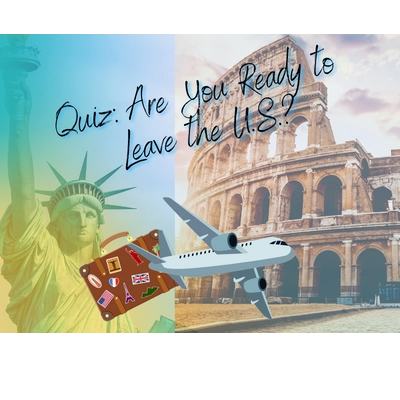
In our last post, we shared why Albania rose to the top of our list during our search for our perfect expat destination for Americans. Two major things set it apart from the other countries we considered: the incredibly low cost of living and the generous visa policy for Americans (one full year visa-free, with a simple 90-day exit to reset the timer). But when you’re not just visiting and you’re actually planning to live somewhere long-term or retire abroad, cost and convenience are only part of the story.
We’re not just looking for a temporary escape, we’re searching for a place we can feel truly at home. So once Albania became our front-runner, we knew it was time to dig deeper. What would life really be like there? What might be hard to adjust to? And why, with such compelling perks, aren’t more people already making the move? Below we’ll unpack some of the drawbacks of moving to Albania and how we (or anyone moving out of the U.S.) can adapt to a new way of living.
Transportation in Albania
The first thing that caught our attention during research? Transportation.
At the time of writing, Albania has only one international airport: Tirana International Airport; though a second is scheduled to open soon in Vlora to the south. There’s ferry access to Albania from neighboring countries like Italy and Greece, and a popular route is to fly into Corfu, Greece and ferry over to the beach town of Saranda. However, ferries slow down in frequency outside of tourist season, and travel time can be lengthy. For example, Bari, Italy to Durrës, Albania is about eight hours, and sailings can get canceled or rescheduled if not enough passengers book.
You can also drive into Albania from surrounding countries if you have access to a car. But what you won’t find is a national or international train system. There are currently no passenger trains that run into or out of Albania, due in part to its decades-long isolationist history. This might not impact day-to-day life much, but it does add a layer of complexity to wider European travel.
Within the country, rail is also minimal. While a train line connecting Durrës, Tirana, and the airport is in development, delays have been frequent and the most recent estimate given has the line not opening until 2026. For now, most travel happens by bus, taxi, bike, or on foot. There are regional bus routes, but they’re far less structured than what many Americans (or Europeans) are used to. You won’t find an online schedule or a central bus terminal, rather just a few parking lots where drivers post their destination and departure times in the window. You’ll pay the fare directly to the driver, usually in cash.

We’re already fans of walking and biking and are pretty used to not having trains (hello, American infrastructure), so we figure we’ll adapt pretty easily. And coming from Colorado, we’re no strangers to having only one international airport. The key difference? Albania offers those short, budget-friendly flights to the rest of Europe we’ve been dreaming about.
In the end, we decided the tradeoffs are worth it, especially if it means living near the beach while spending less and traveling more.
Understanding Albanian Culture
Of course, infrastructure isn’t everything. We had a lot of questions about the culture too:
- Will we need to speak Albanian?
- What’s the food like?
- Are there unfamiliar laws or customs?
- How are Americans perceived?
Language
Much like other parts of Europe, younger Albanians and people in cities often speak English. If you’re in a pinch, look for someone under age 40 and there’s a good chance they’ll be able to help.
Still, it’s always respectful to try learning the local language. Albanian is known for being tricky and it’s not widely offered on popular apps like Duolingo, Babbel, or Rosetta Stone. The app Ling does have an Albanian course, though. We’ve been using it and it feels similar to Duolingo, just a little more textbook-style which we like as it explains the mechanics of the language more than the other apps we’ve tried.
Food
Albanian cuisine feels like a flavorful cousin to Greek and Italian food—simple, fresh, and delicious. Think grilled meats, legumes, olive oil, herbs, and lots of crisp vegetables. Their version of a Greek salad includes cucumbers, tomatoes, olives, and onions all deliciously coated with olive oil, and vinegar, and topped with a brined white cheese that’s similar to feta but with a creamier textier and saltier flavor.

One notable staple food is burek: a flaky, savory pastry often filled with cheese, spinach, or meat. And coffee culture here is serious, too. Espresso is on nearly every corner, but traditional Turkish-style coffee is also widely available, with its thick texture and signature crema.
Religion
This might surprise some people: Albania is incredibly tolerant when it comes to religion. Under the communist regime of Enver Hoxha, religion was banned altogether. Churches and mosques were seized, clergy were arrested, and simply possessing religious materials could get you years in prison.
Since the fall of communism, Albanians have embraced religious freedom, and it’s not uncommon to see Muslims, Catholics, Orthodox Christians, and non-religious people living peacefully side by side. For us, that kind of respect for different beliefs is exactly the kind of environment we want to live in.
Hospitality & Attitudes Toward Americans
One of Albania’s most celebrated cultural traits is hospitality. Albanians are widely known for treating guests with generosity and kindness.
As Americans, we were especially happy to learn that we’re especially well-liked. One reason is the U.S.’s involvement in Kosovo during the 1990s, when the United States helped stop violence against the ethnic Albanians living there. Statues and streets named after American presidents like George W. Bush can even be found in some cities (including the capital, Tirana). Plus, with a large Albanian diaspora living in the U.S., many locals have friends or family across the Atlantic, which adds a personal connection.
So far, everything we’ve learned suggests that Albanians will make us feel welcome, and that means a lot.

Goods and Services in Albania
One of our lingering concerns was access to specific goods and modern services. Albania is still developing, and not everything is as easily accessible as it is in the U.S.
Internet and Utilities
The good news? High-speed internet is widely available in cities. Plans offering 2.5 GBPS go for about $38 per month, and mobile data plans with unlimited data run around $25.
Electricity and water are generally reliable, though occasional blackouts do happen, especially during summer. Tap water is safe to bathe in, but most people buy bottled water for drinking. Trash service usually involves taking your garbage to a communal bin – not curbside pickup like in most U.S. suburbs.
Medical and Veterinary Care
Basic healthcare in Albania is solid, especially in cities. Private facilities are typically higher quality and still much cheaper than U.S. prices and public options are cheaper still. However, for complex procedures or specialist care, you might be better off flying to another European country or back to the U.S.
The same goes for veterinary care. Cities have vets, but specialty services might be limited. This is something we’ll be looking into more during our upcoming scouting trip, especially since our dog Cookie has to eat a specialty food. Dogtor’s orders!

Shopping and Appliances
Most apartments seem to come with standard kitchen appliances, though usually smaller than what we’re used to in our suburban American home. We’ll have to adjust to smaller fridges, but that might actually encourage us to shop fresh and local more often. (As a side note, apartments are often rented fully furnished. This is a huge relief for us as we won’t be able to bring our furniture with us and now won’t have to worry about filling our new living space)
Major online retailers like Amazon don’t operate in Albania, but smaller options like Megatek do exist. We’ve also heard that Temu may deliver to Albania, so that’s another possibility if you need to scratch the online shopping itch.
On our scouting trip, we’ll be checking out pricing and availability of some niche items we care about like sewing machines, stand mixers, air fryers, computer parts, ebikes, and Cookie’s specialty dog food. Stay tuned here and on YouTube and we’ll share what we find!
So… Will Albania Work for Us?
Albania isn’t perfect, but no place is. What we’ve found is a country full of opportunity, natural beauty, hospitality, affordability, and flexibility, and that’s a pretty great place to start!
There are trade-offs, sure. But for what we’re hoping to build, Albania just might be the best place to do it.
We’ll keep digging, keep asking questions, and keep sharing everything we learn. And if you’re on a similar journey, we hope this helps you figure out whether this hidden gem might be right for you too.





